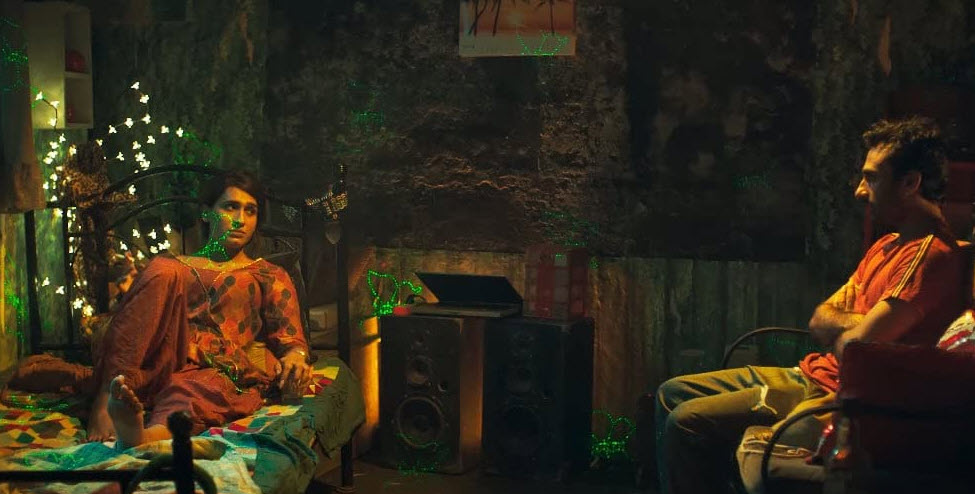Saim Sadiq’s Joyland opens with a figure covered in a sheet, almost like a ghost, unable to see – this is Haider (Ali Junejo), the youngest son of Abba (Salmaan Peerzada) the patriarch of this conservative, traditional family in Lahore.
But Haider is anything but conservative and traditional. He is playing hide and seek with his nieces, and we learn that because he has been unable to find a job, he is helping his sister-in-law Nucchi (Sarwat Gilani) care for her daughters and take care of the household, while his wife, Mumtaz (Rasti Farooq) works as a make-up artist for weddings.
Nucchi is married to Saleem (Sohail Sameer), the eldest son of the family, and as the film opens her water breaks – her fourth pregnancy, and one which, based on an ultrasound, she and her husband believe to be the longed for grandson for Abba. Nucchi is steady and practical – just watching her in the moments after her water breaks, calmly removing her jewelry and telling Haider to get the motorbike to take her to the hospital, we instantly get a snapshot of her role in this household. Like Mumtaz, Nucchi had other aspirations: she earned a degree in interior design, only to be told by her husband to use it to decorate their home after marriage. We understand, though, that unlike Mumtaz, Nucchi has accepted her place in the family as a dutiful wife and mother.
When Haider finally lands a job, everything in the family shifts. Mumtaz loses the little bit of freedom and dignity that her job has given her, settling into a life where she is constrained and forced back into the traditional role Abba sees for her – something, we learn, that she and Haider had tried to avoid when their marriage was arranged. She finds herself not only pregnant, but, it seems, pregnant with the grandson Abba desires.
Haider’s job, however, turns out to be anything but traditional. He tells his family that he’s become a manager at a local erotic dance theatre, but the reality is that Haider has been hired as one of the male back-up dancers for a transwoman dancer, Biba (Alina Khan), with whom Haider falls in love and enters into a relationship. Biba is someone he is attracted to, and yet he really doesn’t understand. And Biba is a fascinating figure – transgender in a society that discriminates and pushes men and women into traditional gender roles, and a dancer in a world where cis men lust after cis women. But Biba knows her own worth, and fights and scraps her way to get what she feels she deserves – a chance to dance on stage (even if it’s only during the interval), a promotional cut-out for the theatre (even if she has to pay for it herself), and as much respect as she can command from those around her. We know, at all times, that Biba feels she is worthy of this respect, even if she doesn’t always get it, and Khan infuses her with a combination of toughness and fragility.
Haider does tell Mumtaz the true nature of his job, likely knowing that it wouldn’t be an issue for her. Mumtaz, like Biba, knows her own value. She knows she has talent, and we constantly see evidence of her intelligence that is devalued in Abba’s home. Mumtaz has plans to buy an air conditioner, before she is forced by Abba to leave her job, and we watch as she and Nucchi rig up a home-made version. Mumtaz tells Haider about the power going out before a bride’s make-up has been finished, and how she directed the salon staff to use the lights on their phones to allow them to see and finish it off – something Haider remembers and uses later when the lights go out during one of Biba’s performances. But Mumtaz, unlike Biba, tries but is unable to assert herself to get what what wants, and what she feels she deserves. Her choices remain limited. Everyone in this household – including her husband, who cannot stand up to either his father or elder brother – refuses to let Mumtaz have her way.
Joyland takes its title from the Pakistani amusement park, where Mumtaz and Nucchi go one evening, after having to beg Abba for permission for Mumtaz to go with Nucchi and her family. It’s a rare moment of freedom and liberation for the two women as they laugh and scream while on one of the rides. The film is both luminous and oppressive, shot using a 4:3 aspect ratio in order to emphasize the narrowness of this world, and how the members of this family are hemmed in and trapped by societal constraints that do not permit them to step outside traditional gender roles, and that force their desires into the shadows. Everything that makes living worthwhile – desire, joy, dignity and self-worth – is forbidden in this household, and though Haider and Mumtaz try to navigate a way to meet expectations while holding on to their own desires, we see how very challenging that is, and how sometimes the only choice one has to be free is also one that is profoundly devastating.

